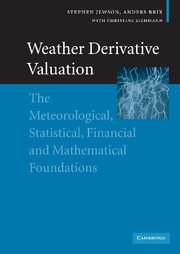 Weather Derivative Valuation
Weather Derivative Valuation Book contents
- Frontmatter
- Contents
- List of figures
- List of tables
- Acknowledgements
- 1 Weather derivatives and the weather derivatives market
- 2 Data cleaning and trends
- 3 The valuation of single contracts using burn analysis
- 4 The valuation of single contracts using index modelling
- 5 Further topics in the valuation of single contracts
- 6 The valuation of single contracts using daily modelling
- 7 Modelling portfolios
- 8 Managing portfolios
- 9 An introduction to meteorological forecasts
- 10 The use of meteorological forecasts in pricing
- 11 Arbitrage pricing models
- 12 Risk management
- 13 Modelling non-temperature data
- A Trend models
- B Parameter estimation
- C Goodness of fit tests
- D Expected pay-offs for normally distributed indices
- E Pay-off variances for normally distributed indices
- F Greeks for normally distributed indices
- G Exact solutions for the kernel density
- H The beta for a normally distributed index
- I Simulation methods
- J Efficient methods for pricing against a portfolio
- References
- Index
11 - Arbitrage pricing models
Published online by Cambridge University Press: 22 September 2009
- Frontmatter
- Contents
- List of figures
- List of tables
- Acknowledgements
- 1 Weather derivatives and the weather derivatives market
- 2 Data cleaning and trends
- 3 The valuation of single contracts using burn analysis
- 4 The valuation of single contracts using index modelling
- 5 Further topics in the valuation of single contracts
- 6 The valuation of single contracts using daily modelling
- 7 Modelling portfolios
- 8 Managing portfolios
- 9 An introduction to meteorological forecasts
- 10 The use of meteorological forecasts in pricing
- 11 Arbitrage pricing models
- 12 Risk management
- 13 Modelling non-temperature data
- A Trend models
- B Parameter estimation
- C Goodness of fit tests
- D Expected pay-offs for normally distributed indices
- E Pay-off variances for normally distributed indices
- F Greeks for normally distributed indices
- G Exact solutions for the kernel density
- H The beta for a normally distributed index
- I Simulation methods
- J Efficient methods for pricing against a portfolio
- References
- Index
Summary
Thus far this book has described the use of actuarial principles for pricing weather derivatives. This chapter will now discuss the application of arbitrage pricing ideas. The main difference between actuarial and arbitrage pricing theories is that actuarial pricing is based on diversification while arbitrage pricing is based on hedging. The anticipation of following a hedging strategy can affect the prices we charge for weather contracts.
A useful context in which to explain arbitrage pricing is that of equity options. The issuer of an equity option can trade the underlying equity in order to hedge his/her risk. If the underlying equity market is liquidly traded, then many such hedging transactions can be performed between the issuance and expiry of the option, and the risk will be hedged almost perfectly. Many hedging trades are necessary because the risk from the equity option depends on the share price and hence varies as the share price fluctuates in time. The cost of the hedging combined with the distribution of payoffs on the option determines the price initially charged for the option, and this price, which we call the ‘arbitrage price’, is generally different from the price that would be charged if no such dynamic hedging were to be undertaken and the option were priced actuarially. In particular, the arbitrage price is not the expectation (although we will see below that it is possible to recover the fact that the price is the expectation, but only by redefining ‘expectation’).
- Type
- Chapter
- Information
- Weather Derivative ValuationThe Meteorological, Statistical, Financial and Mathematical Foundations, pp. 241 - 267Publisher: Cambridge University PressPrint publication year: 2005


